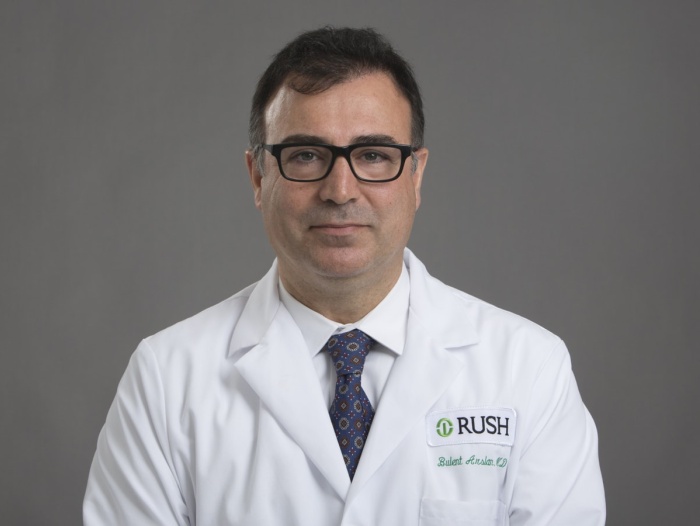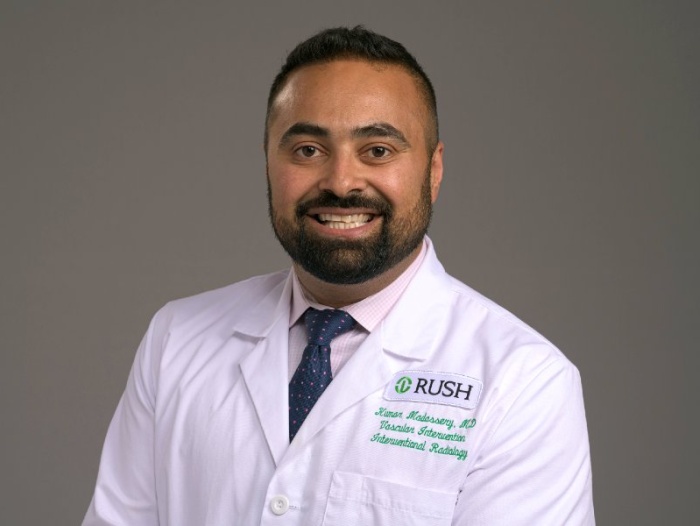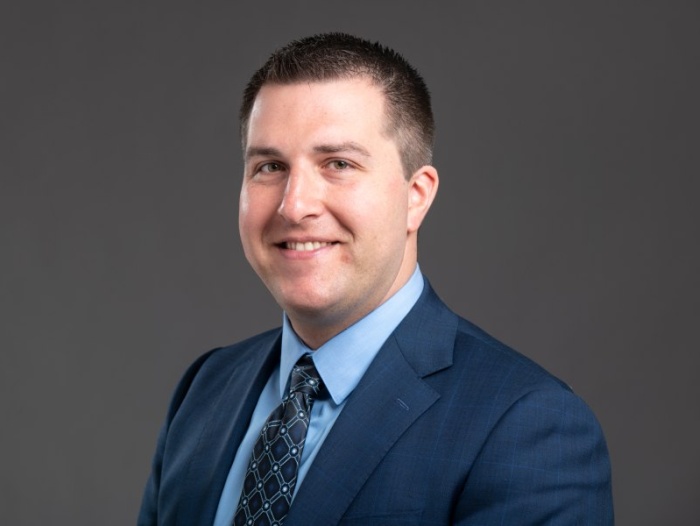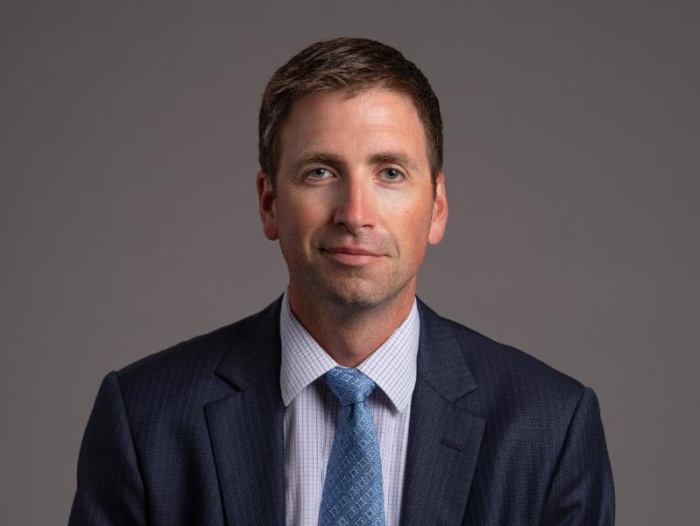Learn about:
VIR at Rush
The vascular & interventional radiology (VIR) department at Rush University Medical Center (RUMC) is staffed by seven full-time interventional radiologists. The section provides VIR services for RUMC Downtown and Rush Oak Park Hospital (ROPH), while also accepting transfers from Rush Copley Medical Center and multiple medical centers throughout Illinois and the Midwest.
The Rush VIR section strives to provide the most current and clinically comprehensive care to patients. While primarily a consultation service for inpatient and outpatient referring providers, we regularly directly admit patients to our service. We maintain an active wound care clinic out of ROPH and regularly schedule primary consultations and follow-up appointments in our downtown clinic.
The faculty are involved in numerous scholarly and research activities. The department sponsors our team member whose abstracts are accepted for. We are also involved in several industry and non-industry sponsored (e.g. NIH) multicenter randomized controlled trials and registries, and residents often present at various including (e.g. SIR, GEST, WCIO, RSNA, etc). Trainees interested in obtaining experience navigating the IRB process will have ample opportunities.
Rush VIR provides clinic management of a variety of conditions, offering both proven and novel procedures. We take pride in providing multidisciplinary care to patients spanning the breadth and depth VIR can offer:
- Oncology:
Biopsy, Ablation (Microwave, Cryoablation, Irreversible Electroporation), Radioembolization, Chemoembolization, Bland Embolization - Arterial/Aortic Disease:
Endoleak management, Peripheral Arterial Disease (PAD) / Critical Limb Ischemia (CLI), SAFARI, Aneurysm/Pseudoaneurysm management - Venous Thromboembolic Disease (VTE):
Acute/Chronic Deep Venous Thrombosis (DVT) Pulmonary Embolus (PE), Inferior Vena Cava (IVC) Filter Placement/Retrieval, Venous reflux and superficial venous disease - Hemodialysis Access Creation & Maintenance:
EndoAVF creation, hemodialysis fistulagram/declot procedures, central venous recanalization, HeRO graft placement - Pain & Musculoskeletal Disease:
Vertebroplasty/Kyphoplasty, nerve block/ablation/neurolysis, diagnostic/therapeutic joint injection - Transplant:
Transjugular management of liver disease, TIPS, BRTO/PARTO, pre- and peri-operative management of organ transplants (e.g. kidney, liver, pancreas) - Enteral access & hepatobiliary disease:
Gastrostomy/gastrojejunostomy/jejunostomy placement and maintenance, obstructive cholangiopathy management, cholecystitis/cholelithiasis management. - Genitourinary disease:
Nephrostomy/nephroureteral catheter placement and maintenance, suprapubic catheter placement and maintenance, ureteral stricture management - Men’s Health:
Varicocele embolization, prostate artery embolization, high-flow priapism - Women’s Health:
Fallopian tube recanalization, uterine fibroid embolization, pelvic venous congestion
Training Sites
- Rush University Medical Center (Downtown)
Tertiary care hospital in downtown Chicago, ranked #19 in the nation by US News and World Report. Rush VIR residents spend the majority of time training at this facility. - Rush Oak Park Hospital (ROPH)
Satellite hospital in Oak Park, IL, a western suburb of Chicago approximately 8 miles west of RUMC. The IR department at ROPH is staffed by the Rush IR group. Residents/fellows spend time rotating through this facility at different points throughout training. - Rubschlager Oncology and Neurosciences Center
A new medical facility connected to the main RUMC via skybridge. The building has state-of-the-art radiology equipment. The facility will further multidisciplinary care Rush IR helps provide. - Rush Copley Medical Center
Satellite hospital in Aurora, IL, a southwestern suburb of Chicago. IR trainees currently do not rotate here, however patients are occasionally transferred downtown. - Rush MD Anderson Cancer Center
Rush has teamed up with MD Anderson Cancer Center to provide cancer care in the Chicago area.
Training Programs
We strive to provide the best comprehensive clinical VIR training and provide our trainees with skills to make substantial contributions to the field following graduation. Our training programs are designed to create interventional radiologists who possess superior judgment, excellent technical skills, and advanced knowledge that is required to provide superb care to a diverse patient population. Our program is busy for potential candidates willing to work hard and to gain the best experience throughout their training. We would like to welcome you to Rush; we look forward to involving you in our exciting academic and clinical program.
We currently offer the following vascular and interventional radiology (VIR) training programs:
-
The ACGME accredited six-year categorical curriculum consists of:
- One-year surgical internship
The one-year surgical internship (PGY-1) is designed with our surgery colleagues to optimize training for future clinical interventional radiologists. In addition to two dedicated blocks on the VIR service, the year includes rotations tailored to patients regularly encountered by VIRs in practice.
- Three years of focused diagnostic radiology training with IR and clinical rotations interspersed throughout
The PGY2-4 years provide the foundational diagnostic radiology training required to excel as a clinical diagnostic and interventional radiologist. To maintain the clinical skills required at graduation, clinical (e.g. ICU) rotations are also interspersed throughout the year.
(click to enlarge)
- Two years of dedicated IR training
During the PGY-5 and PGY-6 years, training is concentrated on the clinical and procedural aspects of interventional radiology. Residents receive diverse training in numerous interventional domains and are provided the opportunity to rotate through procedural electives, such as vascular surgery.
- One-year surgical internship
-
The ACGME accredited two-year curriculum consists follows a similar training path as the PGY-5 and 6 years of the integrated program, focusing on clinical IR training. Applicants are encouraged to be enrolled in an ESIR program prior to applying. Residents receive diverse training in numerous interventional domains and are provided the opportunity to rotate through procedural electives, such as vascular surgery.
-
The VIR training at Rush also offers a 1-year, non-ACGME accredited Advanced IR Fellowship for individuals looking to supplement prior interventional radiology training. The dedicated training is tailored to the individual’s career goals, taking advantage of the breadth, depth, and volume of clinical encounters. Prior graduates have focused on interventional oncology, peripheral arterial disease & wound care, interventional oncology research, hemodialysis access and maintenance, general interventional radiology, and/or research study design and publications. Applicants are encouraged to have finished an ACGME-accredited radiology residency program before applying.
Interested applicants should email the Advanced Fellowship Program Director:
Kumar Madassery, MD
Assistant Professor, Vascular & Interventional Radiology
Director, Advanced Vascular & Interventional Radiology Fellowship
Sreekumar_Madassery@rush.edu
- Assistant ProfessorDepartment of Diagnostic Radiology and Nuclear Medicine







